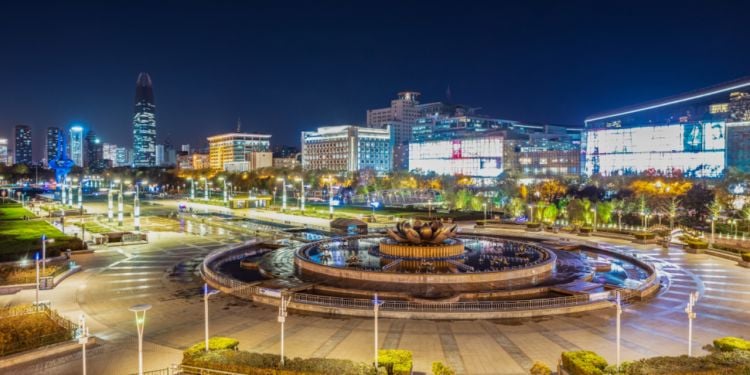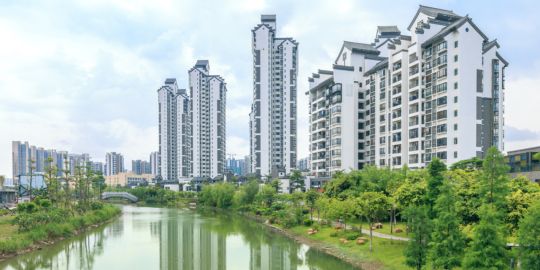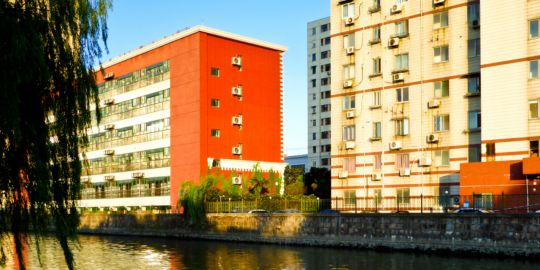Accommodation in China

Jinan is the capital city of China's Shandong province. It is home to over eight million people and is an important administrative and economic center. Jinan is nicknamed the City of Springs because of the large number of hot springs located within the city limits, which has also made it a popular tourist destination for locals and foreign nationals.
Finding a place to settle in Jinan should not be difficult. While it is a large rapidly developing city, it is not yet a notably expensive place to live in. Home to lots of parks and green areas, it also offers a nice and quieter alternative to China's major metropolis.
Why Jinan?
Jinan is the capital city of Shandong province. It's known as the city of springs as there are a lot of underground springs in the area. The most famous of them are Baotu Spring, Black Tiger Spring, Five Dragon Pool and Pearl Spring. There are also many picturesque hiking spots around the city, thanks to the area's mountainous nature.
With a history of over 2600 years, Jinan is the perfect spot to learn about Chinese culture. There is a lot of well-preserved old architecture in the city, and you will find a lot of museums and other places of historical interest.
With that, Jinan is the financial center of Shandong province. This means that there are also quite a few opportunities for employment for expats here. Paired with a lower cost of living (compared to cities like Shanghai or Beijing), Jinan offers a comfortable balance between a developed modern city and a laid-back smaller town.
You will like living in Jinan if you are interested in Chinese culture, enjoying an active lifestyle (including hiking and sightseeing), and don't mind a smaller expat community.
If you are moving to Jinan on a work contract, there is a big chance your accommodation will be sponsored by your company. However, if you are considering moving to the city on your own, you will need to handle the apartment hunting all on your own. We hope this article will help.
Which are the best neighborhoods for expats in Jinan?
Jinan is divided into ten districts and several counties. The city's main districts include Lixia, Shizhong, Huaiyin, Tianqiao, Licheng, Zhangqiu, and several others.
Lixia, Shizhong, Huaiyin, and Tianqiao districts make up the city's urban core. Lixia and Shizhong are Jinan's central densely populated districts where most of the commercial activity is concentrated. Here, you will find plenty of high-rise office buildings, residential neighborhoods, shopping malls, landmarks, and more.
Licheng, Changqing, and Jiyang are considered the city's inner suburbs. Though located further away from the city center, these neighborhoods do have their charm offering a quieter alternative to the city's busier areas.
If you are not afraid of venturing even further, consider Zhangqiu, one of Jinan's greener areas with many parks, gardens and waterways to explore.
What types of accommodation are available in Jinan?
There is not much difference between the types of accommodation available in Jinan compared to other major Chinese cities. You will have a choice of studios, apartments, townhouses, etc. Most apartments available for rent are in good condition with all the necessary facilities. You can also choose between Chinese or Western-styled apartments: most expats prefer the latter option as these apartments are typically newer and require less maintenance work.
Note that Chinese apartments generally have rather small rooms. Kitchens also tend to be more utilitarian and just big enough to house all the necessary kitchen appliances.
Most apartments are equipped with gas — but in some cases, you may need to use an electric cooker. You won't find bathtubs in most apartments in Jinan — unless you are renting something very expensive. Most apartments come with balconies. However, balconies can be quite small, and most families in China use them for drying clothes and storage rather than as a place to enjoy the views from.
Some expats in Jinan prefer to live in closed gated communities. In China, these are often referred to as “gardens”. These types of complexes often have lots of facilities within their walls: gyms, coffee shops, kindergartens, and more.
Your choice of accommodation will most likely depend on your budget and the length of your stay in the city. If you are staying in Jinan for a short time, you can opt for a hotel or an "aparthotel", or even a vacation home. If you plan to stay longer, you can rent a studio, an apartment, or a villa according to your financial means and your family situation. Sharing an apartment is also popular among expats — follow local forums to find apart-mates or those renting out a room.
Rent prices in Jinan
Renting in Jinan is notably cheaper compared to first-tier cities. One-bedroom places in the city start at around RMB 2,000 and go up to RMB 4,500 in higher if they are located in more expensive areas. For a two-bedroom apartment in a good area, you will need to budget from RMB 4,000 to RMB 6,000. Naturally, the bigger and better furnished the apartment is, the more you will be paying in rent.
To save money on rent in Jinan, consider settling further from the city center or sharing a place with friends, classmates or co-workers. You can search for shared accommodation on expat forums and local accommodation websites. Living further away from the city center may be inconvenient. However, Jinan is a very well-connected city, and you should have no trouble commuting to where you need to be.
How to pay utility bills in Jinan
Utilities in China generally work on a pre-paid basis. To pay utilities, you will need to use a special card that you can top up at a utility meter, bank, and other locations across the city. You can check with your landlord about the nearest locations to pay your utilities. Make sure not to lose your utility cards, as these can be quite difficult to replace.
If you find this system confusing, you may also be able to arrange an agreement with your landlord: they will pay for utilities on your behalf, and your utility bill will be added to your monthly rent. This is probably the best arrangement if you are new to the city and this would be your first time handling utilities in China.
If you live in a gated residential community with a management office or concierge, you may also be able to pay your utilities there. This will make things much easier, especially if you are new to China. These types of residential complexes are popular with foreigners — so you may also have fellow expats in the neighborhood to ask for guidance.
How to find accommodation in Jinan?
The best way to find an apartment in Jinan is online. Check out websites like Anjuke, 58.com and others. You can also check expat groups in the city, like Expats in Jinan.
Most apartment ads will tell you how big the apartment is, where it is located, rent conditions (deposit amount) and whether the ad has been posted by a real estate agent or the owner. If you are interested in taking a look at the place, message the post's author with your contact details. In China, the most popular way to communicate online is by using the WeChat app. The app has over 900 million users and is the number one tool you will need for your everyday life in China. WeChat is primarily a messenger app — but you can also use it for shopping online, paying for goods and services via the QR code, and more.
Once you get in touch with a real estate agent or your potential new landlord, they will probably ask you for your WeChat ID. This is why it's a good idea to download the app and learn how to use it before you start your apartment hunt in Jinan.
Another way to search for an apartment in Jinan is by visiting different districts and neighborhoods. Once you've found the location you like, you should easily find a real estate agency office nearby. The agency in the area will most likely specialize in accommodation offers nearby. —so you will have a better chance of renting an apartment in the neighborhood you prefer. If you're looking to rent in gated residential communities, you may also ask the “baoan” (security guard) for any available rentals. The baoan can put you in touch with landlords renting out apartments in the complex.
Important:
Renting accommodation directly from the landlord will help you avoid extra costs such as the agent's finders fee. However, if you're new to Jinan, don't speak Chinese, and are not yet familiar with how things work in the housing market, it will be in your best interest to rent an apartment through a real estate agent. This way, you will have someone experienced representing your interests. Plus, in case of a dispute with your landlord, you will be able to turn to your real estate agent to help resolve it.
Lease agreements in Jinan
There are several things you will need to pay attention to when signing the lease agreement.
- Most rental agreements are written in Chinese. Some will have a shorter English version attached or a translation line under each line in Chinese. If your rental agreement is written entirely in Chinese, get a translator to provide you with an English copy. Never sign any contract in Chinese if you don't understand the meaning of every clause. Even if your contract comes with an English translation, it may be best to have a translator give it another look just to ensure that the original translation is accurate.
- If you are new to Jinan, it's best to have a Chinese friend or colleague present when you sign the lease. This way, you will be able to efficiently address any issues that may come up during the signing. Your Chinese friend will also have a better understanding of what to look out for when signing the lease.
- When you sign the rental agreement in China, there will be an inventory of all the items in the apartment attached to the contract. This includes furniture items, household appliances, apartment decorations, and more. It's important that you give the apartment a proper walk-through and check if all the items on the list are there. If you notice that anything is missing, let the landlord or the real estate agent know. This is the best way to avoid any future disputes with the landlord when you have to move out.
- Make sure to check the apartment for any damage or wear. If you notice any imperfections, it's a good idea to take a picture of them and show them to the landlord or real estate agent before signing the lease.
- In most cases, you will be asked to pay a two-month deposit upfront when you rent an apartment. If you rent a place via a real estate agent, you will also need to pay the agent's fee, which normally amounts to half a month's rent. Make sure to keep your deposit receipts till the end of your lease. You will need them to get your deposit back at the end of your stay.
Useful link:









